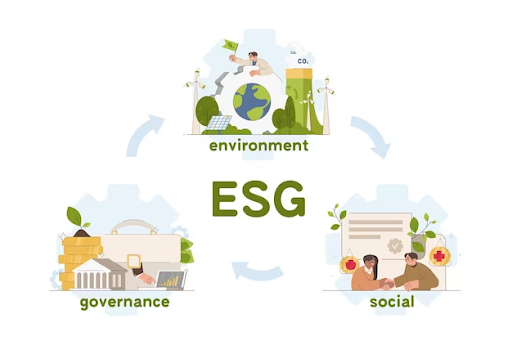1. What is an ESG report?

An ESG report is a document that businesses use to disclose information about their performance related to Environmental, Social, and Governance (ESG) factors. (Governance). This is a way for businesses to make their activities transparent, demonstrating their commitment to sustainable development and social responsibility.
2. Main content of the ESG report

ESG evaluation criteria (environmental, social, governance).
To evaluate the effectiveness of a company's ESG activities, specific measurement indicators are often used. Below are some common indicators:
Environmental Index
Greenhouse gas emissions: Usually measured by the amount of CO2e (carbon dioxide equivalent) emitted.
Energy consumption: Measured by the amount of energy consumed per unit of product or service.
Water consumption: Measured by the amount of water used in the production process.
Waste amount: Measured by the total amount of waste generated and the recycling rate.
Biodiversity: Assessing the impact of business activities on biodiversity.
Social Index
Working conditions: Including wages, working hours, occupational safety, and employee benefits.
Diversity and inclusion: Assessing the diversity of gender, ethnicity, and religion within the workforce.
Community relations: Measuring contributions to the community.
Human rights: Ensure compliance with human rights principles during operations.
Governance index (Governance)
Ownership structure: Assessing the concentration of power and the independence of the board of directors.
Transparency level: Assessing the degree of information disclosure and financial reporting.
Anti-corruption: Evaluating preventive and anti-corruption measures.
Business ethics: Evaluating ethical principles in business.
Examples of typical ESG reports
Many large companies around the world have published detailed and transparent ESG reports. Some notable examples include:
Technology companies: Apple, Google, Microsoft often publish very detailed ESG reports, focusing on issues such as sustainable supply chain management, privacy protection, and workforce diversification.
Energy companies: Major oil companies like Shell and BP are also shifting towards renewable energy business and publishing ESG reports to demonstrate their commitment.
3. Why is ESG important?

Reflecting the reality
ESG reflects a more comprehensive view of a company's operations, not only focusing on financial profits but also including impacts on the environment and society. This helps investors, customers, and stakeholders have a clearer view of the business.
Mitigating risks
Environmental and social issues can pose significant risks to businesses, such as legal risks, reputational risks, or financial risks. Focusing on ESG helps businesses identify and address these risks early on.
Enhancing competitiveness
Customers are increasingly interested in products and services with sustainable origins. Businesses with good ESG practices will attract more customers and build customer loyalty.
Attracting investors
Investors are increasingly paying attention to ESG factors when making investment decisions. Having a good ESG assessment will help businesses attract responsible and long-term investors.
Meeting legal requirements
Many countries have enacted regulations on ESG information disclosure, requiring businesses to be transparent about their activities.
Contributing to sustainable development
The application of ESG principles helps businesses contribute to solving social and environmental issues, moving towards a more sustainable future.
4. Benefits of building an ESG report

For Businesses:
Enhancing brand reputation: ESG reports demonstrate the company's commitment to sustainable development, helping to build a positive image and attract customers and partners.
Mitigating risks: Identifying and managing ESG issues helps businesses reduce legal risks, reputational risks, and financial risks related to environmental and social issues.
Improving operational efficiency: The process of creating ESG reports helps businesses identify opportunities to enhance operational efficiency, save costs, and optimize resources.
Attracting talent: Candidates are increasingly interested in working for socially responsible companies. ESG reports demonstrate the company's commitment to employees and attract outstanding talents.
Expanding business opportunities: More investors and customers increasingly prioritize collaborating with businesses that have sustainable practices, and ESG reports will help companies access new business opportunities.
For Investors:
Effective risk assessment: ESG reports provide detailed information on environmental and social risks that the business is facing, helping investors make informed investment decisions.
Diversifying the investment portfolio: Companies with good ESG practices often have stable and sustainable financial performance, helping investors diversify their investment portfolio.
Meeting investor demand: More and more institutional and individual investors are paying attention to ESG factors when selecting stocks.
Contributing to sustainable development: Investing in companies with good ESG practices is a way to contribute to the sustainable development of society.
For Society:
Contributing to sustainable development: The activities of businesses reported in ESG can help address social issues such as climate change, inequality, and poverty.
Improving living environments: Businesses committed to ESG often engage in environmental protection activities, contributing to the improvement of air, water, and soil quality.
Enhancing transparency: ESG reports help enhance transparency in business operations, allowing society to monitor and evaluate the impacts of enterprises.
5. Current state of ESG implementation in Vietnam
Although awareness of the importance of ESG is increasingly being raised in Vietnam, the application of ESG standards in business practices still varies significantly among enterprises.
Large enterprises with foreign investment often take the lead in developing and implementing ESG strategies, while small and medium-sized enterprises, especially in rural areas, still face many difficulties. One of the main reasons is the lack of a clear and detailed legal framework for ESG. Although the Government has issued several related legal documents, the ESG legal framework is still incomplete, leading to a lack of consistency in implementation and supervision.
In addition, limited financial capacity is also a major barrier, especially for small and medium-sized enterprises. Investing in ESG activities requires significant financial resources, while many businesses still face competitive pressure and difficulties in accessing capital. The lack of human resources with expertise in ESG is also a significant challenge. Vietnam still lacks experts with extensive knowledge of ESG, leading to difficulties in developing and implementing effective strategies.
Finally, the lack of transparent information about ESG is also a matter of concern. Many businesses have not yet truly valued the disclosure of information about their ESG activities, which makes it difficult for investors and stakeholders to evaluate and compare. To address these limitations, close cooperation between the government, businesses, and social organizations is needed to build a sustainable ESG ecosystem in Viet nam.
6. Challenges and opportunities in applying ESG in Vietnam
The application of ESG standards in Vietnam is opening up many opportunities but also poses several challenges. Regarding opportunities, raising awareness about sustainable development has created a green market full of potential. Consumer demand for environmentally friendly products and services is increasing, driving businesses to innovate. In addition, international economic integration also encourages Vietnamese businesses to adopt ESG standards to enhance their competitiveness in the global market.
However, challenges still persist. One of the biggest challenges is the lack of a specific and synchronized legal framework. The lack of clear regulations on ESG makes it difficult for businesses to comply and assess effectiveness. In addition, limited financial capacity and a lack of specialized human resources are also significant barriers. Many businesses, especially small and medium-sized enterprises, do not yet have sufficient resources to invest in ESG activities. In addition, the lack of transparent information about ESG activities is also an issue that needs to be addressed. To fully leverage opportunities and overcome challenges, Vietnamese businesses need thorough preparation, the development of appropriate ESG strategies, and support from the government, international organizations, and the community.
7. The level of commitment to ESG practices in Vietnam

According to the PWC report (2024), the ESG commitment rate of listed companies is 93%, exceeding the average level in Vietnam, which is 80%.
On the other hand, according to Dr. Nguyen Thanh Nga, "More than half of listed companies in Vietnam (58%) are currently in and will be in the planning phase in the next 2-4 years."
Dr. Nguyen Thanh Nga, Deputy Director of the Institute of Financial Strategy and Policy, Ministry of Finance, stated that since 2015, the green stock market in Vietnam has been formed and developed, including both green stocks and green bonds. Currently, the government is gradually perfecting the ESG policy framework. The Deputy Director of the Institute of Financial Strategy and Policy affirmed that the green stock market is increasingly expanding in scale. Listed companies on the stock market are demonstrating a high level of commitment to fulfilling ESG commitments.
However, the Chief Economist of BIDV also believes that the number of companies producing separate sustainability reports is still low, and the ESG goals set are quite vague.
To effectively implement these solutions, Mr. To Tran Hoa stated that the State Securities Commission (SSC) will carry out several synchronized measures, including: coordinating with ministries and sectors to issue a national green classification list that aligns with economic sector classifications and international practices; requiring companies with green projects to disclose information transparently, comprehensively, and accurately about these projects; and encouraging listed companies and public enterprises to invest in green projects to create competitive advantages in the market.
8. Conclusion
ESG is not just a trend but also the future of business. To keep up with trends and achieve sustainable development, Vietnamese businesses need to proactively build and publish ESG reports. This is a challenging journey but also opens up many new opportunities. Building ESG reports is an important step for Vietnamese businesses to enhance transparency, attract investors, and contribute to the sustainable development of the country. However, to achieve success, strong support from the government and cooperation from the entire society are needed.